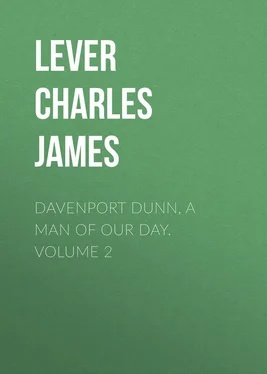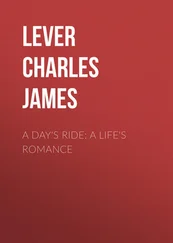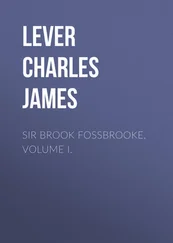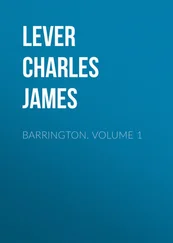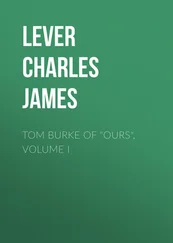Charles Lever - Davenport Dunn, a Man of Our Day. Volume 2
Здесь есть возможность читать онлайн «Charles Lever - Davenport Dunn, a Man of Our Day. Volume 2» — ознакомительный отрывок электронной книги совершенно бесплатно, а после прочтения отрывка купить полную версию. В некоторых случаях можно слушать аудио, скачать через торрент в формате fb2 и присутствует краткое содержание. Жанр: literature_19, foreign_antique, foreign_prose, на английском языке. Описание произведения, (предисловие) а так же отзывы посетителей доступны на портале библиотеки ЛибКат.
- Название:Davenport Dunn, a Man of Our Day. Volume 2
- Автор:
- Жанр:
- Год:неизвестен
- ISBN:нет данных
- Рейтинг книги:3 / 5. Голосов: 1
-
Избранное:Добавить в избранное
- Отзывы:
-
Ваша оценка:
- 60
- 1
- 2
- 3
- 4
- 5
Davenport Dunn, a Man of Our Day. Volume 2: краткое содержание, описание и аннотация
Предлагаем к чтению аннотацию, описание, краткое содержание или предисловие (зависит от того, что написал сам автор книги «Davenport Dunn, a Man of Our Day. Volume 2»). Если вы не нашли необходимую информацию о книге — напишите в комментариях, мы постараемся отыскать её.
Davenport Dunn, a Man of Our Day. Volume 2 — читать онлайн ознакомительный отрывок
Ниже представлен текст книги, разбитый по страницам. Система сохранения места последней прочитанной страницы, позволяет с удобством читать онлайн бесплатно книгу «Davenport Dunn, a Man of Our Day. Volume 2», без необходимости каждый раз заново искать на чём Вы остановились. Поставьте закладку, и сможете в любой момент перейти на страницу, на которой закончили чтение.
Интервал:
Закладка:
What a changeful life was it now that he led, – at one time a tutor, at another a commissionaire for an hotel, a railway porter, a travelling servant, a police spy, the doorkeeper of a circus company, editor of an English journal, veterinary, language master, agent for patent medicines, picture-dealer, and companion to a nervous invalid, which, as Paul said, meant a furious maniac. There is no telling what he went through of debt and difficulty, till the police actually preferred passing him quietly over the frontier to following up with penalty so incurable an offender. In this way had he wandered about Europe for years, the terror of legations, the pestilence of charitable committees. Contributions to enable the Rev. Paul Classon to redeem his clothes, his watch, his divinity library, to send him to England, to the Andes, to Africa, figured everywhere. I dare not say how often he had been rescued out of the lowest pit of despondency, or snatched like a brand from the burning; in fact, he lived in a pit, and was always on fire.
“I am delighted,” said Davis, as he replenished his friend’s plate, – “I am delighted to see that you have the same good, hearty appetite as of old, Paul.”
“Ay, Kit,” said he, with a gentle sigh, “the appetite has been more faithful than the dinner; on the same principle, perhaps, that the last people who desert us are our creditors!”
“I suspect you ‘ve had rather a hard time of it,” said Davis, compassionately.
“Well, not much to complain of, – not anything that one would call hardships,” said Classon, as he pushed his plate from him and proceeded to light a cigar; “we ‘re all stragglers, Kit, that’s the fact of it.”
“I suppose it is; but it ain’t very disagreeable to be a straggler with ten thousand a year.”
“If the having and enjoying were always centred in the same individual,” said Classon, slowly, “what you say would be unanswerable; but it’s not so, Kit. No, no; the fellows who really enjoy life never have anything. They are, so to say, guests on a visit to this earth, come to pass a few months pleasantly, to put up anywhere, and be content with everything.” Grog shook his head dissentingly, and the other went on, “Who knows the truth of what I am saying better than either of us? How many broad acres did your father or mine bequeath us? What debentures, railroad shares, mining scrip, or mortgages? And yet, Kit, if we come to make up the score of pleasant days and glorious nights, do you fancy that any noble lord of them all would dispute the palm with us? Oh,” said he, rapturously, “give me the unearned enjoyments of life, – pleasures that have never cost me a thought to provide, nor a sixpence to pay for! Pass the wine, Kit, – that bottle is better than the other;” and be smacked his lips, while his eyes closed in a sort of dreamy rapture.
“I ‘d like to hear something of your life, Paul,” said Davis. “I often saw your name in the ‘Times’ and the ‘Post,’ but I ‘d like to have your own account of it.”
“My dear Kit, I ‘ve had fifty lives. It’s the man you should understand, – the fellow that is here;” and he slapped his broad chest as he spoke. “As for mere adventures, what are they? Squalls that never interfere with the voyage, – not even worth entering in the ship’s log.”
“Where’s your wife, Paul?” asked Davis, abruptly, for he was half impatient under the aphorizing tone of his companion.
“When last I heard of her,” said Classon, slowly, as he eyed his glass to the light, “she was at Chicago, – if that be the right prosody of it, – lecturing on ‘Woman’s Rights.’ Nobody knew the subject better than Fanny.”
“I heard she was a very clever woman,” said Davis.
“Very clever,” said Classon; “discursive; not always what the French call ‘consequent,’ but, certainly, clever, and a sweet poetess.” There was a racy twinkle in that reverend eye as he said the last words, so full of malicious drollery that Davis could not help remarking it; but all Classon gave for explanation was, “This to her health and happiness!” and he drained off a bumper. “And yours, Kit, – what of her?” asked he.
“Dead these many years. Do you remember her?”
“Of course I do. I wrote the article on her first appearance at the Surrey. What a handsome creature she was then! It was I predicted her great success; it was I that saved her from light comedy parts, and told her to play Lady Teazle!”
“I ‘ll show you her born image to-morrow, – her daughter,” said Davis, with a strange choking sensation that made him cough; “she’s taller than her mother, – more style also.”
“Very difficult, that, – very difficult, indeed,” said Classon, gravely. “There was a native elegance about her I never saw equalled; and then her walk, the carriage of the head, the least gesture, had all a certain grace that was fascination.”
“Wait till you see Lizzy,” said Davis, proudly; “you ‘ll see these all revived.”
“Do you destine her for the boards, Kit?” asked Classon, carelessly.
“For the stage? No, of course not,” replied Davis, rudely.
“And yet these are exactly the requirements would fetch a high price just now. Beauty is not a rare gift in England; nor are form and symmetry; but, except in the highly born, there is a lamentable deficiency in that easy gracefulness of manner, that blended dignity and softness, that form the chief charm of woman. If she be what you say, Kit, – if she be, in short, her mother’s daughter, – it is a downright insanity not to bring her out.”
“I ‘ll not hear of it! That girl has cost me very little short of ten thousand pounds, – ay, ten thousand pounds, – schooling, masters, and the rest of it. She ‘s no fool, so I take it; it ain’t thrown away! As regards beauty, I’ll stake fifteen to ten, in hundreds, that, taking your stand at the foot of St. James’s Street on a drawing-room day, you don’t see her equal. I’m ready to put down the money to-morrow, and that’s giving three to two against the field! And is that the girl I ‘m to throw away on the Haymarket? She’s a Derby filly, I tell you, Paul, and will be first favorite one of these days.”
“Faustum sit augurium!” said Classon, as he raised his glass in a theatrical manner, and then drained it off. “Still, if I be rightly informed, the stage is often the antechamber to the peerage. The attractions that dazzle thousands form the centre of fascination for some one.”
“She may find her way to a coronet without that,” said Davis, rudely.
“Ah, indeed!” said Paul, with a slight elevation of the eyebrow; but though his tone invited a confidence, the other made no further advance’s.
“And now for yourself, Classon, what have you been at lately?” said Davis, wishing to change the subject.
“Literature and the arts. I have been contributing to a London weekly, as Crimean correspondent, with occasional letters from the gold diggings. I have been painting portraits for a florin the head, till I have exhausted all the celebrities of the three villages near us. My editor has, I believe, run away, however, and supplies have ceased for some time back.”
“And what are your plans now?”
“I have some thoughts of going back to divinity. These newly invented water-cure establishments are daily developing grander proportions; some have got German bands, some donkeys, some pleasure-boats, others rely upon lending libraries and laboratories; but the latest dodge is a chaplain.”
“But won’t they know you, Paul? Have not the newspapers ‘blown you’?”
“Ah, Davis, my dear friend,” said he, with a benevolent smile, “it’s far easier to live down a bad reputation than to live up to a good one. I ‘d only ask a week – one week’s domestication with the company of these places – to show I was a martyred saint. I have, so to say, a perennial fount of goodness in my nature that has never failed me.”
Читать дальшеИнтервал:
Закладка:
Похожие книги на «Davenport Dunn, a Man of Our Day. Volume 2»
Представляем Вашему вниманию похожие книги на «Davenport Dunn, a Man of Our Day. Volume 2» списком для выбора. Мы отобрали схожую по названию и смыслу литературу в надежде предоставить читателям больше вариантов отыскать новые, интересные, ещё непрочитанные произведения.
Обсуждение, отзывы о книге «Davenport Dunn, a Man of Our Day. Volume 2» и просто собственные мнения читателей. Оставьте ваши комментарии, напишите, что Вы думаете о произведении, его смысле или главных героях. Укажите что конкретно понравилось, а что нет, и почему Вы так считаете.
